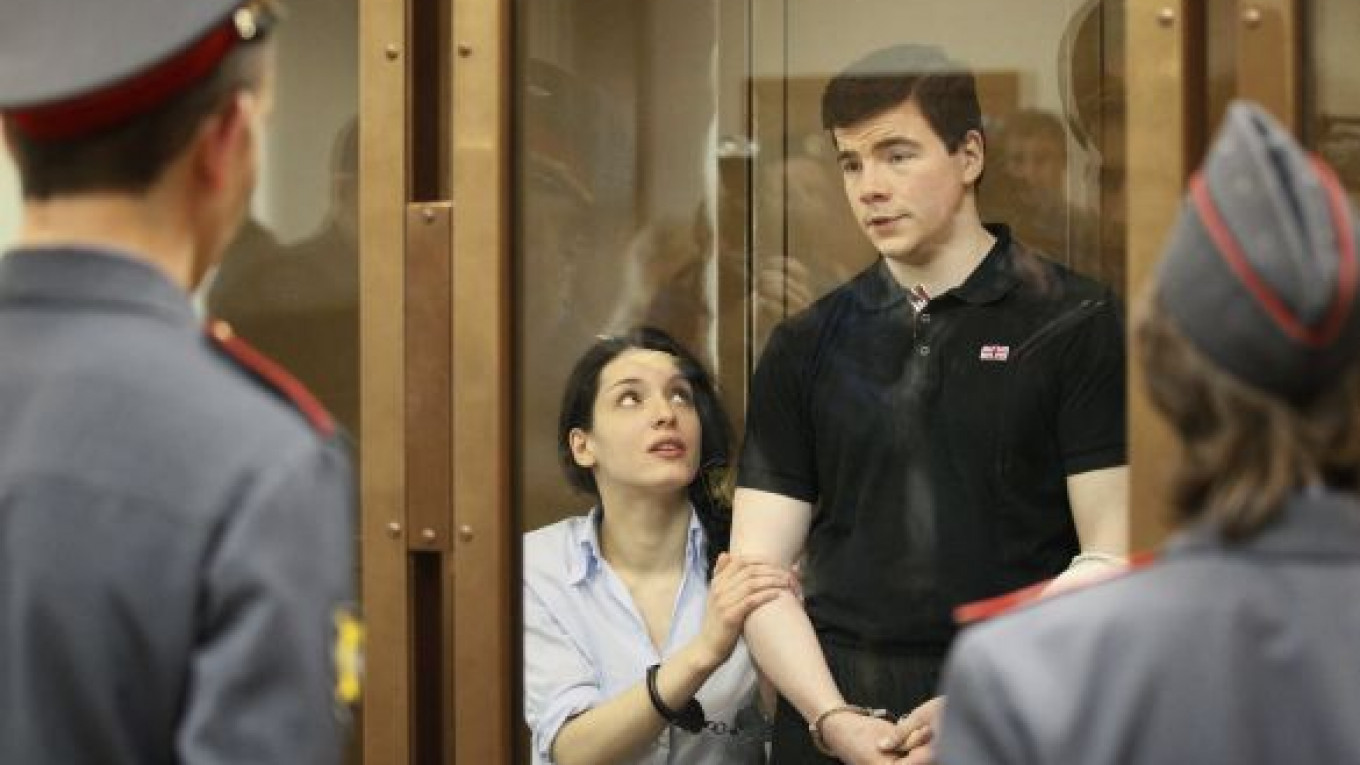An ultranationalist was sentenced to life in prison, and his girlfriend received an 18-year sentence for the brazen daylight killing of human rights lawyer Stanislav Markelov and a Novaya Gazeta reporter.
Nikita Tikhonov, 31, received the maximum sentence after the court convicted him of gunning down Markelov and journalist Anastasia Baburova. Tikhonov's 26-year-old girlfriend, Yevgenia Khasis, was convicted as an accomplice in the January 2009 attack, and sentenced to 18 years in prison.
A jury earlier ruled that Tikhonov was the masked killer who used a 1910 Browning pistol to shoot Markelov and Baburova as they walked out of a news conference into a snowy street near the Kremlin. Khasis followed the two from the conference hall and helped Tikhonov identify the lawyer and the reporter, who wore heavy winter clothes and hats.
The defendants, who denied the charges, smiled from their courtroom cage as the judge read aloud the sentence Friday, appearing uninterested at times and whispering to each other throughout. They were convicted a week earlier.
Judge Alexander Zamashnyuk said the defendants were "led by the idea of their own superiority and ideological hatred toward Markelov."
Tikhonov, with tattooed Celtic symbols on his arms and bandages on his wrists, shouted to the judge that he "understood the sentence." Celtic imagery is popular among Russian neo-Nazis, with the Celtic cross thought to be a substitute for the swastika.
"We will come out much earlier," Tikhonov said as police escorted him and Khasis out of the courtroom.
Defense lawyer Alexander Vasilyev called the sentence "illegal and unfounded" and said he would appeal, while senior prosecutor Boris Laktionov said he was "satisfied" with the outcome.
The 34-year-old Markelov's work had angered nationalists, who had threatened him and cheered his killing in Internet comments. The lawyer also had made enemies through his work fighting for victims of rights abuses in Chechnya.
Investigators said Baburova, 25, was shot because she was a witness to the murder.
Tikhonov, the son of a counterintelligence officer, joined ultranationalist groups while studying history at Moscow State University, where he wrote a thesis on the "genocide" of ethnic Russians in Chechnya.
Police tracked down Tikhonov and Khasis by their messages on Internet forums and tapped their phones months ahead of their arrest in November 2009. In their rented Moscow apartment, investigators said the two kept an arsenal of arms and explosives, books on criminal justice and firearms, as well as detailed plans by ultranationalist groups for seizing power in Russia.
Tikhonov immediately confessed to the killing but later said he was forced to confess because police threatened to abuse Khasis.
Two prominent ultranationalists testified against him during the 2 1/2-month trial, with one of them claiming that Tikhonov planned further killings of government officials and anti-racist activists.
Markelov's 2009 killing marked a tactical change for neo-Nazis and ultranationalists, who switched to killings of anti-racist activists and government officials and terrorist attacks, watchdog Sova said.
In April 2010, a federal judge who presided over trials of White Wolves, a mostly teenage group of skinheads convicted of killing and assaulting non-Slavs, was gunned down contract-style outside his Moscow apartment.
Members of a neo-Nazi group accused of planning to blow up a mosque, a McDonald's restaurant and railway stations in Moscow are currently standing trial.
A Message from The Moscow Times:
Dear readers,
We are facing unprecedented challenges. Russia's Prosecutor General's Office has designated The Moscow Times as an "undesirable" organization, criminalizing our work and putting our staff at risk of prosecution. This follows our earlier unjust labeling as a "foreign agent."
These actions are direct attempts to silence independent journalism in Russia. The authorities claim our work "discredits the decisions of the Russian leadership." We see things differently: we strive to provide accurate, unbiased reporting on Russia.
We, the journalists of The Moscow Times, refuse to be silenced. But to continue our work, we need your help.
Your support, no matter how small, makes a world of difference. If you can, please support us monthly starting from just $2. It's quick to set up, and every contribution makes a significant impact.
By supporting The Moscow Times, you're defending open, independent journalism in the face of repression. Thank you for standing with us.
Remind me later.






